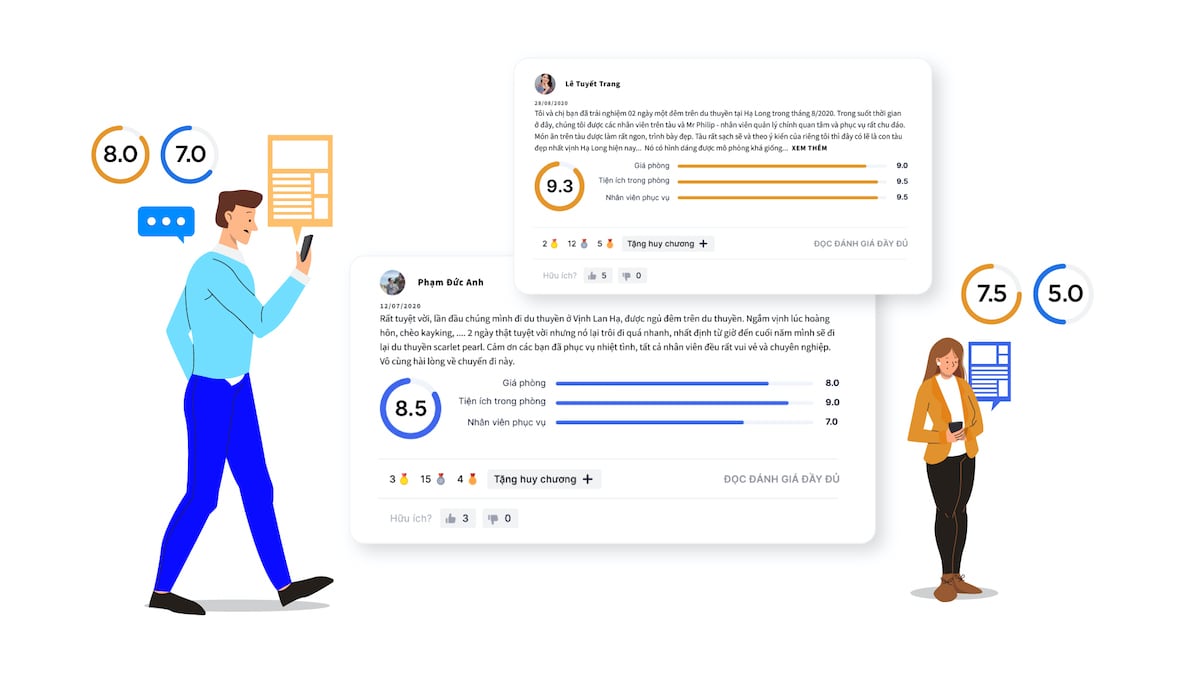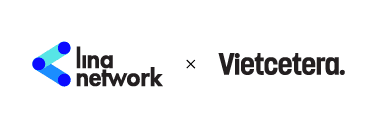Earlier this month, we had the chance to interview the founder and the strategic advisor of Lina Network about the company’s contribution to helping Southeast Asian governments manage administrative data. Today, Vietcetera throws the doors open once again to welcome two young talents on Lina's leadership team - Mr. Bach Tran, the CEO and Ms. Trang Pham, CMO.
During our conversation, the duo gave us an insight into why Lina Network chose Vietnam as its base, and how the company is using its technologies as a force for good to provide practical solutions for the local economy.

Can you give us a brief introduction about yourself?
Bach: My name is Bach and I'm currently serving as the CEO of Lina Network. Before joining the company, I spent 10 years studying and working in the Finance & Investment sector in the UK. Having done my time there, I began researching into and investing in Decentralized App (DApp) and blockchain businesses.
Trang: My name is Trang and I am Lina Network’s CMO. After finishing my Bachelor of Finance at RMIT University, I went on to study for a Master’s in Business Administration degree. As of now, I have more than 5 years of experience in the field of SaaS (software as a service) and marketing, as well as business marketing and digital transformation solutions consultancy.

What is the reason behind your decision to place Lina Network's headquarter in Vietnam?
Trang: When Lina Network was founded in 2017, blockchain was still a foreign concept in Vietnam. While cryptocurrencies and their transactions were common, the general public still knew little of blockchain and its application in different fields.
For Lina Network, this was a challenge. But at the same time, it was an opportunity for Vietnam to catch up with the rest of the world technology-wise. Our country is endowed with abundant resources and human capital, and practically the same head-start as other countries when it comes to blockchain. So, naturally, we thought: Why don't we build it right here in Vietnam?
Bach: Another reason why Lina Network decided to place our headquarter in Vietnam was our aspiration to develop blockchain-based products that would provide practical solutions for our country. So our ultimate goal is to create a complete blockchain system for Vietnam.
What kind of qualities do you seek in a candidate when building a team here?
Trang: Lina Network’s mission is to solve society’s central problems through the application of technology. As such, no matter what position we're hiring for, the qualities that we expect to see in our candidates are a passion for technology; an eagerness to learn; an open mindset; and a willingness to tackle challenges head-on to create better products and optimal solutions to benefit society.

What sectors have been impacted by the introduction of blockchain?
Trang: What's fundamental about blockchain is that it's very transparent and immutable, so it’s commonly used in transaction processing as well as systems and data storage by different sectors, mainly finance, retail, e-commerce, supply chain, logistics, healthcare, education, etc.
Blockchain is also being put to good use in agriculture due to its traceability. A good example is Walmart using blockchain throughout its entire supply chain, from farms to consumers. Lina Network is also working on its traceability platform to streamline the supply chain process which would result in higher quality agricultural products.
Another area that we’re focusing on is the application of blockchain for e-governments, healthcare, and customers' product evaluation.
Among Lina Network’s many blockchain-based products, which has the most potential to succeed in Vietnam?
Bach: In a country like Vietnam where agriculture plays a major role, it's an agri-business marketplace or a traceability product that would generate the most value.
Another industry that has the potential to boost the region’s overall economy is tourism. Today, purchasing decisions in the sector are swayed by reviews when it comes to trip planning and accommodation booking. By collecting a large number of reviews, not only would business be able to influence customers' search behavior and mode of travel, they would also be able to capture valuable insights, and thereby develop and promote the most appropriate products.
As of the moment, Vietnam's tourism industry is still heavily reliant on international review sites. Thus, we aspire to build a more transparent domestic platform called Lina Review, where more objective, high-quality and reliable reviews can be cultivated. With Lina Review, businesses can reduce the amount of time it usually takes for review collection, and consequently improve the quality of products and offer services faster, while still keeping the costs of promoting the product down. The long-term outcome of this is that we could become more proactive in controlling the narratives of our country's tourism.

How can Lina Review as well as other review platforms build credibility?
Bach: In my opinion, in order to build credibility for a review platform, there are three major issues that we need to tackle, the first being the number of reviews. The fewer reviews there are, the less objective they might be, which could negatively sway the public attitude toward the products. The second is the quality of reviews. Fake or spam reviews must be flagged. And finally, review applicability. Reviews must be up-to-date to be relevant.
There are different approaches to address these concerns. But the most essential task is to get business owners to understand that fabricated reviews do not and cannot reflect the quality of their services or products. Following that, we must create incentives to attract users and develop a scoring mechanism for objective evaluation.
The Know Your Customer (KYC) process must also be executed constantly in order to eliminate fraud and score tampering by treating reviews from all users as fairly as possible. It is only when all of these are achieved that a sense of trust can be established between the consumers and the brand, and that the brands and consumers can be protected from slandering efforts.

What incentives will Lina Network be implementing to attract more users for Lina Review?
Trang: I think that with any technology product, the climb from the first to the 10,000th user is extremely rocky. Every product on the market starts with these questions: Who is our competitor? What competitive advantages does our product have over the others on the market? What are the current consumers' habits and behaviors?
Of course, each industry has different review platforms, but when we put ourselves in the shoes of our users, we found that on these platforms they did not have as much authority as the businesses.
So with Lina Review, we wanted to build something that will empower reviewers by helping consumers make better shopping decisions while encouraging them to make reviews themselves. In return, they will be rewarded with benefits such as points and discounts just like they would with other platforms.
When we were surveying the market for Lina Review, we selected sectors where we think reviews are most vital to the success of the business and to meeting the needs of the consumers in that sector. From here on we’ll further expand the product’s applicability to other sectors and user groups.
Apart from Lina Review, will Lina Network be launching any other products in Vietnam?
Bach: We’ve got two products in the pipeline that we're expecting to launch in the foreseeable future. One of them is Lina MarketTrust – an e-commerce platform that would connect traders, buyers and farmers of agricultural products. The other one is called Lina FarmTrust and it’s a tool that can assist farmers in recording farming activities, extracting data to register for certification, estimating harvest yields, tracing down agricultural products if problems arise and assisting with inventory management.
These are two independent products, but they’re mutually related and can be utilized concurrently for the agricultural sector. On the macro front, Lina Network will continue to develop e-government and digital identification solutions.
It's our hope that Lina Network would be recognized as a provider of practical platforms and market solutions, rather than just a DApp application. If users want to seek reviews, Lina Review will be the perfect choice for them. For those who want to trace the origins of a product, Lina FarmTrust is there to help. The Lina Network’s ecosystem will strive to serve the needs of the community through its diverse product catalogue.
We also want to spotlight Vietnamese tech talents who are more than capable of building complex applications and DApps to create more quality products for Vietnamese consumers.

